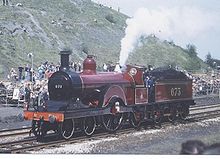- Midland Railway 115 Class
-
Midland Railway 115 Class Power type Steam Designer Samuel W. Johnson Build date 1896–1899 Total produced 15 Configuration 4-2-2 UIC classification 2′A1 n Gauge 4 ft 8 1⁄2 in (1,435 mm) Driver diameter 7 ft 9 1⁄2 in (2.375 m) Fuel type Coal Boiler pressure 170 psi (1.17 MPa) Cylinders Two, inside Cylinder size 19 × 26 in (483 × 660 mm) Tractive effort 15,279 lbf (68.0 kN) Career Midland Railway,
London, Midland and Scottish RailwayClass 115 Number 670–684 from 1907 The Midland Railway 115 Class is a class of 4-2-2 steam locomotive. They were known as "Spinners", possibly because of the wheelslip that the single large driving wheel caused. They were designed by Samuel W. Johnson and a total of 15 of the class were built between 1896-99. It was quite common for this class of engine to pull a typical Midland express weighing 200 and 250 tons which suited the Class 115 perfectly. Given a dry rail they could maintain a tight schedule with 350 tons. Speeds up to 90mph were not uncommon and the sight of their whirring huge driving wheels earned them the nickname "Spinners". Thanks to the Midland's practice of building low powered locomotives and relying on double heading to cope with heavier trains many enjoyed working lives of up to 40 years. They made ideal pilot engines for the later Johnson/Deeley 4-4-0 classes.
In the Midland Railway 1907 renumbering scheme, they were assigned numbers 670–684. During the World War one most were placed in store but surprisingly pressed into service afterwards as pilots on the Nottingham to London coal trains. Twelve locomotives survived to the 1923 grouping, keeping their Midland Railway numbers in London, Midland and Scottish Railway service. Nevertheless by 1927 only three of the class remained, with the last engine, 673 (né 118) being withdrawn in 1928 and preserved.
Preservation
No. 673 is the sole survivor of its class. It was steamed around 1976–1980 when it took part in the Rainhill Trials 150th cavalcade but is currently a static exhibit in the National Railway Museum in York.
External links
References
- Classic British steam Locomotives
- Casserley, H.C.; S. W. Johnson (1966, 1974). Locomotives at the Grouping 3: London, Midland and Scottish Railway. Shepperton, Surrey: Ian Allan Limited. ISBN 0-7110-0554-0.

This steam locomotive-related article is a stub. You can help Wikipedia by expanding it.

